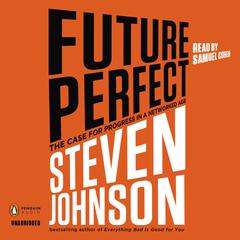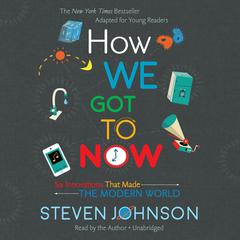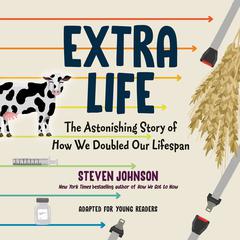 Play Audiobook Sample
Play Audiobook Sample
The Invention of Air: A Story of Science, Faith, Revolution, and the Birth of America Audiobook
 Play Audiobook Sample
Play Audiobook Sample
Quick Stats About this Audiobook
Total Audiobook Chapters:
Longest Chapter Length:
Shortest Chapter Length:
Average Chapter Length:
Audiobooks by this Author:
Publisher Description
Bestselling author Steven Johnson recounts—in dazzling, multidisciplinary fashion—the story of the brilliant man who embodied the relationship between science, religion, and politics for America’s Founding Fathers. The Invention of Air is a book of world-changing ideas wrapped around a compelling narrative, a story of genius and violence and friendship in the midst of sweeping historical change that provokes us to recast our understanding of the Founding Fathers. It is the story of Joseph Priestley—scientist and theologian, protégé of Benjamin Franklin, friend of Thomas Jefferson—an eighteenth-century radical thinker who played pivotal roles in the invention of ecosystem science, the discovery of oxygen, the founding of the Unitarian Church, and the intellectual development of the United States. And it is a story that only Steven Johnson, acclaimed juggler of disciplines and provocative ideas, can do justice to. In the 1780s, Priestley had established himself in his native England as a brilliant scientist, a prominent minister, and an outspoken advocate of the American Revolution, who had sustained long correspondences with Franklin, Jefferson, and John Adams. Ultimately, his radicalism made his life politically uncomfortable, and he fled to the nascent United States. Here, he was able to build conceptual bridges linking the scientific, political, and religious impulses that governed his life. And through his close relationships with the Founding Fathers—Jefferson credited Priestley as the man who prevented him from abandoning Christianity—he exerted profound if little-known influence on the shape and course of our history. As in his last bestselling work, The Ghost Map, Steven Johnson here uses a dramatic historical story to explore themes that have long engaged him: innovation and the way new ideas emerge and spread, and the environments that foster these breakthroughs. And as he did in Everything Bad Is Good for You, Johnson upsets some fundamental assumptions about the world we live in—namely, what it means when we invoke the Founding Fathers—and replaces them with a clear-eyed, eloquent assessment of where we stand today.
Download and start listening now!
"Steven Johnson places Joseph Priestley well in his time as well as in the intellectual development science (natural philosophy), faith (a founder of the Unitarian Church), and political theory (interactions with Benjamin Franklin, John Adams and Thomas Jefferson) coming out of the Age of Enlightenment. His multi-disciplinary approach laid the groundwork for ecosystem theories in today's science even though his experiments were as an "amateur." Finally, the end of the story regarding how the Jeffereson-Priestley letters had such a profound influence on the later Adams-Jefferson infamous correspondence exchanges was fascinating."
— William (5 out of 5 stars)
Quotes
-
“What enlivens the book is that Johnson does not simply describe the system within which Priestley and his contemporaries hashed out the features of classical science; he sets it against other, later systems for comprehending physical reality, showing laymen how far we have come from the classical age of science.”
— New York Times
Awards
-
One of the 2009 New York Times Book Review 100 Notable Books for Nonfiction
-
A New York Times bestseller
The Invention of Air Listener Reviews
-
" What an excellent book! It goes beyond the usual biography and puts the life of Joseph Priestley into a much broader context. Priestley was an amazing person -- a scientist, historian, and political and religious theorist who collaborated with Ben Frankilin, Thomas Jefferson, and Erasmus Darwin. Great book. "
— Chris, 2/15/2014 -
" Steven Johnson has not disappointed in the past, I'm looking forward to this one. (I think my fav of his so far is Emergence). "
— Brett, 2/6/2014 -
" The final ten pages bring the central ideas together beautifully with an guardedly optimistic tone. Those last ten pages have left me with plenty to consider. "
— Jason, 1/27/2014 -
" i heard of mr. priestly as cofounder of the unitarian church, but this book really shines a light on a man who helped shape the intellectual climate of the usa, as well as create ecosystem science. i will be reading other steven johnson books after this. "
— Neil, 1/25/2014 -
" This is more than a biography. The author discusses scientific change, the relations between scientists and politicians in the 18th century, and more. It's an interesting perspective on British supporters of the American and French revolutions as well as on developments in chemistry. "
— Mary, 1/19/2014 -
" Despite a interesting enough subject matter, it read mostly like a decent undergraduate paper. "
— Fypast, 1/8/2014 -
" Not only a biographical work about Joseph Priestley, but a great read about how scientific thought and innovation happens - the unpredictable mix of creativity, conversations with others, just plain accidents and coincidences, patience, and risk-taking. "
— Aurora, 12/29/2013 -
" It is a bit boring but brings about interesting thought. More of a biography of Priestly than the chronicles of scientific reason in the US. "
— Jasmine, 12/29/2013 -
" This was an interesting biography but more academic than I like. "
— John, 11/26/2013 -
" This was a really good book - the story of Joseph Priestley, for those of us who just knew "he discovered oxygen", it gives an interesting look at the history of the time, and the study of chemistry as a discipline in its infant stage. "
— Liz, 10/29/2013 -
" A Story Of Science, Faith, Revolution, And The Birth Of America "
— Steven, 10/20/2013 -
" From the halfway point, this book appears to be Extremely good. It's compelling stories are very engaging. "
— Tyler, 8/14/2013 -
" I love studying the founding of our country. It was really interesting reading this book and seeing how the founder's were intertwined with the scientists of the time. Joseph Priestly led a fascinating life. It was a good read. "
— Kl, 6/7/2013 -
" Very interesting story of Joseph Priestley, an Enlightenment man whose simultaneous investigations into science, politics, and religion had a profound influence on the American Revolution and on scientific advancement in general. "
— Kristen, 2/27/2013 -
" Great insights into Joseph Priestly and his time. Includes the close relationships Priestly had in his life - Benjamin Franklin, Thomas Jefferson and John Adams, among others. An easy and profitable read. "
— G0thamite, 8/9/2012 -
" Fun to read, made me want to have a better grounding in early AmHist. Mind still reeling from contemplating the history of oxygen levels on the Earth and how determinate it's been for all living things. "
— Jenine, 5/16/2012 -
" Wonderful mixture of history and the roots of modern science. "
— John, 7/5/2011 -
" A little light on the religious/political connections, but the first half of the book is really fascinating "
— Peggy, 6/29/2011 -
" Not sure that I've ever been sadder finishing a book. Extremely engaging story of a man enraptured by ideas. "
— Adam, 5/7/2011 -
" Wow such a major figure in science and so quickly forgot. I great story to hear and know about. "
— Michael, 3/21/2011 -
" It is a bit boring but brings about interesting thought. More of a biography of Priestly than the chronicles of scientific reason in the US. "
— Jasmine, 12/22/2010 -
" Insight into 18th century science, the product of free thinking. "
— Tbooker, 12/15/2010 -
" He gives the subject a little too much credit for discovering Oxygen. A fun book if you don't mind wading through a bunch of history. I liked the discussion of the carboniferous era. "
— Jim, 12/14/2010 -
" This was a book club selection and a little over my head on the science part but I did enjoy learning about Joseph Priestly. "
— Gaye, 11/18/2010 -
" Loved the premise, such an interesting person and ideas. Writing style didn't appeal to me should have been more engaging on such an interesting subject. "
— Ellen, 11/6/2010
About Steven Johnson
Steven Johnson is the author of twelve books, including How We Got to Now, a New York Times bestseller and the basis for the Emmy–winning PBS/BBC series How We Got to Now. He is also the host of the podcast American Innovations.
About Mark Deakins
Mark Deakins is an AudioFile Earphones Award–winning narrator and actor whose television appearances include Head Case, Star Trek: Voyager, and Buffy the Vampire Slayer. His film credits include Intervention, Star Trek: Insurrection, and The Devil’s Advocate. He wrote, directed, and produced the short film The Smith Interviews.






































